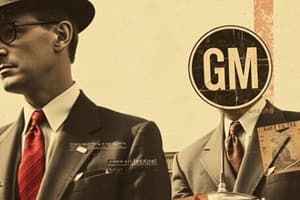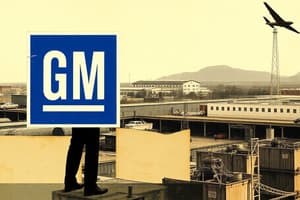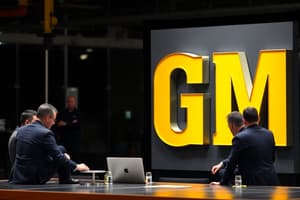Podcast
Questions and Answers
What was a significant issue at the GM Fremont Plant before the NUMMI transformation?
What was a significant issue at the GM Fremont Plant before the NUMMI transformation?
- Low assembly costs per car
- Low absenteeism rates
- High number of unresolved grievances (correct)
- High employee morale
What was the absenteeism rate at the GM Fremont Plant in 1982?
What was the absenteeism rate at the GM Fremont Plant in 1982?
- 20% (correct)
- 30%
- 10%
- 2%
Which product was produced at the GM Fremont Plant during its struggle in 1982?
Which product was produced at the GM Fremont Plant during its struggle in 1982?
- Geo Prism
- Chevrolet Camaro
- Chevrolet Malibu
- Chevrolet Nova (correct)
How did the productivity of the NUMMI Plant compare to the Fremont Plant?
How did the productivity of the NUMMI Plant compare to the Fremont Plant?
What was the primary strategy of General Motors in the 1950s related to union presence?
What was the primary strategy of General Motors in the 1950s related to union presence?
What is the primary assumption of the Great Man theory?
What is the primary assumption of the Great Man theory?
Which leadership theory focuses on traits inherited by individuals?
Which leadership theory focuses on traits inherited by individuals?
What aspect of power distribution is characteristic of an aristocracy?
What aspect of power distribution is characteristic of an aristocracy?
What is a limitation often discussed in trait theories of leadership?
What is a limitation often discussed in trait theories of leadership?
What assumption underlies the bureaucratic distribution of power?
What assumption underlies the bureaucratic distribution of power?
Which statement best describes the infocratic distribution of power?
Which statement best describes the infocratic distribution of power?
Which leadership theory suggests that effective leaders adapt their style depending on the situation?
Which leadership theory suggests that effective leaders adapt their style depending on the situation?
What is a common misconception about leaders discussed in the content?
What is a common misconception about leaders discussed in the content?
What is the main focus of transformational leaders?
What is the main focus of transformational leaders?
Which factor do transformational leaders prioritize in their leadership style?
Which factor do transformational leaders prioritize in their leadership style?
In the diamond model of leadership, which aspect is NOT part of the results category?
In the diamond model of leadership, which aspect is NOT part of the results category?
What is a critical component for gaining commitment from team members?
What is a critical component for gaining commitment from team members?
What is the primary objective of the KIABI competition?
What is the primary objective of the KIABI competition?
Which of the following is NOT an aspect of the leader's role in the diamond model?
Which of the following is NOT an aspect of the leader's role in the diamond model?
How should transformational leaders approach the development of their followers?
How should transformational leaders approach the development of their followers?
What reward is offered to the winners of the KIABI competition?
What reward is offered to the winners of the KIABI competition?
What is the main goal of the competition announced by Top Management?
What is the main goal of the competition announced by Top Management?
What reward is offered for the main competition?
What reward is offered for the main competition?
What is the additional side competition about?
What is the additional side competition about?
What type of room will the first meeting with employees be held in?
What type of room will the first meeting with employees be held in?
Who is responsible for the management of the women’s and men’s departments?
Who is responsible for the management of the women’s and men’s departments?
How many employees does the manager have under their responsibility?
How many employees does the manager have under their responsibility?
What is the desired outcome of winning the competition for the manager?
What is the desired outcome of winning the competition for the manager?
What time frame is defined for measuring sales progression in the competition?
What time frame is defined for measuring sales progression in the competition?
What do contingency theories of leadership emphasize?
What do contingency theories of leadership emphasize?
According to behavioral theories of leadership, what is emphasized in the development of leaders?
According to behavioral theories of leadership, what is emphasized in the development of leaders?
In which scenario would an authoritarian leadership style be most appropriate?
In which scenario would an authoritarian leadership style be most appropriate?
What key aspect do participative leadership theories promote?
What key aspect do participative leadership theories promote?
Which statement best describes management theories of leadership?
Which statement best describes management theories of leadership?
What is a primary assertion of situational theories of leadership?
What is a primary assertion of situational theories of leadership?
What do White and Hodgson suggest is crucial for effective leadership?
What do White and Hodgson suggest is crucial for effective leadership?
Which of the following is a key focus of transactional leadership theories?
Which of the following is a key focus of transactional leadership theories?
Flashcards
GM Sunbelt Strategy
GM Sunbelt Strategy
General Motors' strategy to build plants in the southern and western USA to avoid union influence. This was seen by unions as a way to avoid union control of plants.
GM Fremont Plant (1982)
GM Fremont Plant (1982)
GM's Fremont plant in 1982, characterized by high absenteeism, unresolved grievances, frequent wildcat strikes, and poor quality/productivity compared to Japanese competitors.
GM NUMMI Plant (1986)
GM NUMMI Plant (1986)
GM's NUMMI plant in 1986, a significant improvement over the 1982 plant with lower absenteeism, fewer grievances, fewer strikes, and notably better quality and significantly increased productivity.
Productivity Improvement (NUMMI)
Productivity Improvement (NUMMI)
Signup and view all the flashcards
Quality Improvement (NUMMI)
Quality Improvement (NUMMI)
Signup and view all the flashcards
Aristocracy
Aristocracy
Signup and view all the flashcards
Bureaucracy
Bureaucracy
Signup and view all the flashcards
Infocracy
Infocracy
Signup and view all the flashcards
Great Man Theory
Great Man Theory
Signup and view all the flashcards
Trait Theory
Trait Theory
Signup and view all the flashcards
18th Century Leadership
18th Century Leadership
Signup and view all the flashcards
19th & 20th Century Leadership
19th & 20th Century Leadership
Signup and view all the flashcards
Information Age Leadership
Information Age Leadership
Signup and view all the flashcards
Contingency Leadership
Contingency Leadership
Signup and view all the flashcards
Situational Leadership
Situational Leadership
Signup and view all the flashcards
Authoritarian Leadership
Authoritarian Leadership
Signup and view all the flashcards
Democratic Leadership
Democratic Leadership
Signup and view all the flashcards
Behavioral Leadership
Behavioral Leadership
Signup and view all the flashcards
Participative Leadership
Participative Leadership
Signup and view all the flashcards
Transactional Leadership
Transactional Leadership
Signup and view all the flashcards
Effective Leadership
Effective Leadership
Signup and view all the flashcards
Transformational Leadership
Transformational Leadership
Signup and view all the flashcards
Commitment
Commitment
Signup and view all the flashcards
KIABI Vicenza Competition
KIABI Vicenza Competition
Signup and view all the flashcards
Sales Progression
Sales Progression
Signup and view all the flashcards
Employee Engagement
Employee Engagement
Signup and view all the flashcards
Organizational Performance
Organizational Performance
Signup and view all the flashcards
Strategy
Strategy
Signup and view all the flashcards
Competition
Competition
Signup and view all the flashcards
KIABI Sales Competition
KIABI Sales Competition
Signup and view all the flashcards
Employee Photo Competition
Employee Photo Competition
Signup and view all the flashcards
Meeting in Employee Room
Meeting in Employee Room
Signup and view all the flashcards
Motivation Strategies
Motivation Strategies
Signup and view all the flashcards
Employee Room Size
Employee Room Size
Signup and view all the flashcards
Women's Department Management
Women's Department Management
Signup and view all the flashcards
Competition Reward
Competition Reward
Signup and view all the flashcards
Sales Progression
Sales Progression
Signup and view all the flashcards
Study Notes
Leadership: Session 2
- SKEMA Business School is an accredited business school.
- The session is about leadership.
- GM Leadership Problems: A cartoon illustrates a problem at GM.
GM Leadership Problems: A Case Study
- GM's 1950s strategy expanded plants in the Sunbelt (non-union).
- This angered unions, leading to major conflict at new plants.
- A case study document explores this.
- The link https://sloanreview.mit.edu/article/how-to-change-a-culture-lessons-from-nummi/ is provided for further background.
- A 1982 GM Fremont plant was poorly performing with high absenteeism (20%), unresolved grievances (2000), annual grievances (5000), wildcat strikes (3-4), and poor product quality (30% worse than Japan in assembly costs per car)
The GM Leadership Story: 1982 Fremont Plant
- Employees: 5000
- Absenteeism: 20%
- Unresolved Grievances: 2000
- Total Annual Grievances: 5000
- Wildcat Strikes: 3-4
- Product: Chevrolet Nova
- Assembly Costs per Car: 30% over Japan
- Productivity: Worst in GM
- Quality: Worst in GM
The NUMMI Leadership Story: 1986 Plant
- Employees: 2000
- Absenteeism: 2%
- Unresolved Grievances: 0
- Total Annual Grievances: 2
- Wildcat Strikes: 0
- Product: Chevrolet Nova + Geo Prism
- Assembly Costs per Car: Same as Japanese
- Productivity: Double GM Average
- Quality: Best in GM
What Needs Did New Management at NUMMI Meet?
- Need for understanding
- Need for value
- Other needs are listed
Paradigm Shifts in Management
- Aristocracy (18th Century): Power distributed by gender and lineage. Assumption: "Father knows best."
- Bureaucracy (19th and 20th Centuries): Power distributed by gender and office. Assumption: "Boss knows best."
- Infocracy (Information Age): Power redistributing to key process contributors (KPC's). Assumption: "KPC's know best."
Main Leadership Theories
- Great Man
- Trait
- Contingency
- Situational
- Behavioral
- Participative
- Management
- Relationship
Great Man Theory
- Leaders are born, not made.
- Inborn characteristics (charisma, confidence, intelligence, social skills) determine leadership.
- Leadership is an inherent quality, not something learned.
Trait Theories
- Leaders inherit qualities that enable successful leadership.
- Certain personality and behavioral characteristics are shared by effective leaders (e.g., extroversion, self-confidence, courage)
Contingency Theories
- Leadership style depends on the situation.
- Effective leaders adjust their style to suit the needs of the context, behaviors and needs of their followers.
Situational Theories
- Leaders choose the best course of action based on situational variables.
- Leadership style depends on factors such as decision-making, group knowledge, and member experience.
- Example, Authoritarian style may suit a group with little knowledge, others might perform better in a democratic environment.
Behavioral Theories
- Leadership is developed, more about actions than mental qualities.
- Focus is on leadership actions rather than internal qualities.
- Leaders are skilled through teaching and observation.
Participative Leadership
- Leaders consider others' inputs while making decisions.
- Leaders encourage participation and help group members feel more engaged in decision-making.
- The leader still retains the right to make the final decision.
Management Theories
- Also known as transactional theories, focus on supervision and performance.
- Reward and punishment system as the basis for leadership.
Relationship Theories
- Focus on leader-follower relationships and inspiring followers.
- Transformational leaders motivate and inspire by focusing on the importance of the task and helping members achieve their potential.
- Those who are successful often have high moral standards.
The Diamond Model of Leadership
- A model showing the many aspects and variables of leadership success that should be considered as a leader.
Commitment
- Students choose one question to answer:
- How can I get commitment from people?
- How can I create commitment in employees towards my team or organization?
The KIABI Vicenza Short Case and Analysis
- KIABI store competition in Vicenza, Italy.
- Competition: Highest sales progression in October-December in Women's Departments compared to previous year.
- Winner: Free dinner at a fancy restaurant.
- Side competition: Most interesting employee photos.
Quantitative Results (October-December 2011)
- Data on sales progression for various KIABI stores.
HLBT Method for Communicating
- A method for effective communication in public, digital presentations, and teams.
Studying That Suits You
Use AI to generate personalized quizzes and flashcards to suit your learning preferences.
Related Documents
Description
Explore the complexities of leadership through a detailed case study on GM's challenges during the 1982 Fremont plant situation. This session highlights the impact of leadership decisions on workforce relations and productivity, focusing on issues like absenteeism and grievances. Gain insights into lessons learned from GM's past and the evolution of leadership strategies.




